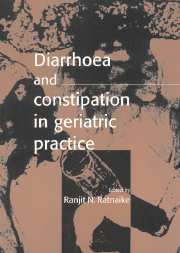Book contents
- Frontmatter
- Contents
- List of contributors
- Preface
- Acknowledgments
- Foreword by Gary R. Andrews
- I Defences of the aging gastrointestinal tract
- II Diarrhoea
- III Noninfectious clinical entities
- 11 Coeliac disease
- 12 Inflammatory disorders of the colon
- 13 Neoplasia and diarrhoea
- 14 Irritable bowel syndrome
- 15 Endocrine, metabolic and miscellaneous causes of diarrhoea
- IV Constipation
- V Perspectives of altered bowel function
- Index
14 - Irritable bowel syndrome
Published online by Cambridge University Press: 17 August 2009
- Frontmatter
- Contents
- List of contributors
- Preface
- Acknowledgments
- Foreword by Gary R. Andrews
- I Defences of the aging gastrointestinal tract
- II Diarrhoea
- III Noninfectious clinical entities
- 11 Coeliac disease
- 12 Inflammatory disorders of the colon
- 13 Neoplasia and diarrhoea
- 14 Irritable bowel syndrome
- 15 Endocrine, metabolic and miscellaneous causes of diarrhoea
- IV Constipation
- V Perspectives of altered bowel function
- Index
Summary
Irritable bowel syndrome (IBS) is probably the most common cause of gastrointestinal dysfunction in the elderly. IBS is considered a benign, noninflammatory, nonprogressive and chronic bowel disorder with numerous symptoms. Over the years this syndrome has been referred to by synonyms such as spastic colon, mucus colitis, nervous diarrhoea and neurotic bowel.
IBS is defined as at least bi-weekly nonmenstrual abdominal distress with diarrhoea, constipation, or alternation between the two, over at least three months, for which no organic cause can be found. Another, more comprehensive, definition is that IBS is ‘chronic or recurrent symptoms attributable to the intestines and occurring in varying but characteristic combinations of abdominal pain, bloatedness (distension) and symptoms of disordered defaecation, especially urgency, straining, feeling of incomplete evacuation and altered stool form and frequency’.
There is no data to suggest that the symptoms of IBS in the elderly are different from younger patients. Although much has been written about IBS, information on people over the age of 65 years is limited.
In a survey of 328 subjects over the age of 65 years by Talley and colleagues (1992) the prevalence of symptoms compatible with IBS was 10.9 per 100.
Epidemiology
Irrespective of age, at least half the patients who complain of gastrointestinal symptoms are diagnosed as suffering from IBS. About five million people within the European Community are likely to have IBS.
- Type
- Chapter
- Information
- Diarrhoea and Constipation in Geriatric Practice , pp. 162 - 170Publisher: Cambridge University PressPrint publication year: 1999



